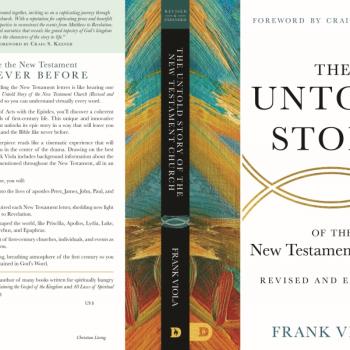Kathryn Soper opens her survey of LDS feminism with an entertaining anecdote from her college days, in which she and three classmates perform the diverse species of feminism with a campy panache not often encountered on the dreary expositional stage of a course on literary theory. The tale introduces the central observation of the piece, that Mormon "feminism is a conversation" between overlapping-but-distinct values and interests, and its central argument, that the rhetorical and social power of the conversational form can bring about fruitful cooperation among diverse parties.
I recently suggested that the conversational trope is central to a familiar progressive discourse, and Kathy's piece nicely illustrates why that vocabulary has been so successful: because it elegantly musters the pluralisms that organize the progressive worldview. With clarity and respect, the essay taxonomizes the varieties of Mormon feminism and sketches the tensions inherent in each. And Kathy offers both hope and realism in her vision of a faithful feminist future for the Church, beginning with, of course, a new conversation.
But the piece is more than a simple survey. It presents an amiable argument of its own, urging Latter-day Saints to embrace not the particular aims of the larger feminist movement, but what she calls its "ultimate gift: the opportunity for women to exercise their power of choice." Here, too, her opening anecdote is instructive. In its tableau of four brands of feminism, performed and displayed to aid the onlookers in choosing their preferred identities, we see a schematized version of the social reality Kathy envisions for LDS women. She describes an "expanded paradigm" of LDS womanhood, stripped of stereotype, in which individual women are free to choose their personae from among a wide variety of available models -- four, forty, or four-hundred. It is feminism, she suggests, that guarantees such a radical personal freedom for women.
Buried at the center of this argument is a startling theological claim. Kathy suggests that third-wave feminism's emphasis on "choice" -- that is, on legitimizing women's identities and behaviors primarily on the basis that they were freely chosen --supplies the social environment in which the Mormon conception of moral agency can be realized. Experience only brings moral growth when it is freely chosen from among an array of possible alternatives, including immoral alternatives; righteousness is located at the moment of executive free will. Thus: "[W]ithout the rights and freedoms afforded by feminism, Mormon women could not freely choose many of our most valued roles within and without the domestic sphere, and therefore could not merit the earthly and heavenly rewards of doing so."
Even leaving aside the perplexing implications of this claim for virtually every past generation of women, one is left with the strong claim that conditions of both personal autonomy and social permissiveness are necessary for moral behavior.
In defense of this idea, it must be noted that LDS notions of choice and moral agency do enjoy a certain pride of place, particularly in the Book of Mormon. Even a reading as robust and triumphalist as Kathy's can quite plausibly marshal support from texts like 2 Nephi 2. And I think Kathy is right to connect this strand of Mormon teaching with the aims of third-wave or "choice" feminism, inasmuch as she intends to make feminism palatable for a Mormon audience: an emphasis on choice, understood as autonomy and free will, does represent a site of genuine convergence for Mormon feminists.
And yet I think such a strong reading of choice also presents a theological problem. The notion that women are -- or ought to be -- radically free to choose their ultimate destinies, or even their proximate identities, is unable to account for the myriad ways in which subjectivity, even if it were miraculously liberated from ideology, is always already constrained and dispersed, distorted and diminished by everything from geopolitics to neurology. The self is a subject, and as such is subject to everything it witnesses. One can find in LDS scripture the resources for a more modest conception of agency, one that is able to conceptualize "choice" as something thicker than the self-expression of the consumer shopping for an eternal identity.
Similarly, third-wave feminism has been hampered by the theoretical weakness of its model of "choice." If any behavior or identity can be called a feminist gesture as long as it is freely chosen, the movement is left without any conceptual basis for evaluation -- that is, without a vocabulary of morality beyond the vexed notion of "consent." This lack has seriously impaired the movement's ability to communicate with the broader populace and -- notably in this context -- has limited its appeal for conservative and religious women.
All this is not to say that the conversation -- that inevitable conversation -- should stop. On the contrary, I look forward to Kathy's contributions on the topic of Mormon feminism, as on all topics. But I hope that one of the conversational byways will explore a philosophical vocabulary that transcends the limitations of choice.
For more responses to Kathryn Soper's As Sisters in Zion, click here.
12/1/2010 5:00:00 AM





